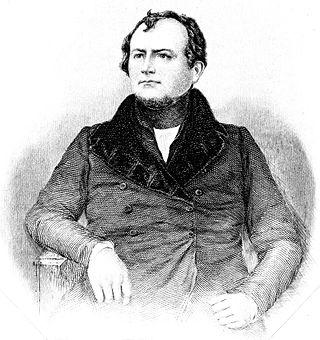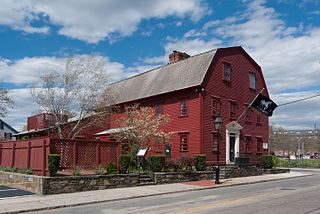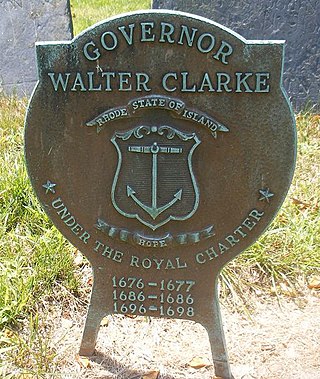
Rhode Island is a state in the New England region of the Northeastern United States. It borders Connecticut to its west; Massachusetts to its north and east; and the Atlantic Ocean to its south via Rhode Island Sound and Block Island Sound; and shares a small maritime border with New York, east of Long Island. Rhode Island is the smallest U.S. state by area and the seventh-least populous, with slightly fewer than 1.1 million residents as of 2020; but it has grown at every decennial count since 1790 and is the second-most densely populated state, after New Jersey. The state takes its name from the eponymous island, though nearly all its land area is on the mainland. Providence is its capital and most populous city.

The Dorr Rebellion (1841–1842) was an attempt by residents to force broader democracy in the state of Rhode Island. It was led by Thomas Wilson Dorr, who mobilized his followers to demand changes to the state's electoral rules. The state was still using its 1663 colonial charter as a constitution, which required that voters own land as qualification to vote. The rebellion established a parallel government alongside the existing chartered government and wrote a new constitution for Rhode Island. It failed, but it forced the rewriting of the state constitution to expand eligibility to vote.

The State of Rhode Island General Assembly is the state legislature of the U.S. state of Rhode Island. A bicameral body, it is composed of the lower Rhode Island House of Representatives with 75 representatives, and the upper Rhode Island Senate with 38 senators. Members are elected in the general election immediately preceding the beginning of the term or in special elections called to fill vacancies. There are no term limits for either chamber. The last General Assembly election took place on November 3, 2020.

Thomas Wilson Dorr, was an American politician and reformer in Rhode Island, best known for leading the Dorr Rebellion.

Arthur Fenner was an American politician who served as the fourth Governor of Rhode Island from 1790 until his death in 1805. He has the seventh longest gubernatorial tenure in post-Constitutional U.S. history at 5,641 days. Fenner was a prominent Country Party (Anti-federalist) leader. Around 1764, Fenner joined several others as a petitioner for the chartering of the College in the English Colony of Rhode Island and Providence Plantations.

The history of Rhode Island is an overview of the Colony of Rhode Island and Providence Plantations and the state of Rhode Island from pre-colonial times to the present.
The Law and Order Party of Rhode Island was a short-lived political party in the state of Rhode Island in the 1840s, brought into existence as a consequence of the Dorr Rebellion.

The Rhode Island Supreme Court is the court of last resort in the U.S. State of Rhode Island. The Court consists of a Chief Justice and four Associate Justices, all selected by the Governor of Rhode Island from candidates vetted by the Judicial Nominating Commission. Each justice enjoys lifetime tenure and no mandatory retirement age, similar to Federal judges. Justices may be removed only if impeached for improper conduct by a vote of the Rhode Island House of Representatives and convicted by trial in the Rhode Island Senate.
Dutee Jerauld Pearce was an American politician and a United States Representative from Rhode Island.
The Constitution of the State of Rhode Island is a document describing the structure and function of the government of the U.S. State of Rhode Island.

The Old Colony House, also known as Old State House or Newport Colony House, is located at the east end of Washington Square in the city of Newport, Rhode Island, United States. It is a brick Georgian-style building completed in 1741, and was the meeting place for the colonial legislature. From independence in 1776 to the early 20th century, the state legislature alternated its sessions between here and the Rhode Island State House in Providence.
Since the Great Depression, Rhode Island politics have been dominated by the Rhode Island Democratic Party, and the state is considered part of the Democrats' "Blue Wall." Democrats have won all but four presidential elections since 1928, with the exceptions being 1952, 1956, 1972, and 1984. The Rhode Island Republican Party, although virtually non-existent in the Rhode Island General Assembly, has remained competitive in gubernatorial elections, having won one as recently as 2006. Until 2014, Democrats had not won a gubernatorial election in the state since 1992, and it was not until 2018 that they won one by double digits. The Rhode Island General Assembly has continuously been under Democratic control since 1959.

Walter Clarke (1640–1714) was an early governor of the Colony of Rhode Island and Providence Plantations and the first native-born governor of the colony. The son of colonial President Jeremy Clarke, he was a Quaker like his father. His mother was Frances (Latham) Clarke, who is often called "the Mother of Governors." While in his late 20s, he was elected as a deputy from Newport, and in 1673 was elected to his first of three consecutive terms as assistant. During King Philip's War, he was elected to his first term as governor of the colony. He served for one year in this role, dealing with the devastation of the war, and with the predatory demands of neighboring colonies on Rhode Island territory during the aftermath of the war.

The Rhode Island Royal Charter provided royal recognition to the Colony of Rhode Island and Providence Plantations, approved by England's King Charles II in July 1663. It superseded the 1643 Patent for Settlement and outlined many freedoms for the inhabitants of Rhode Island. It was the guiding document of the colony's government over a period of 180 years.
Randall Holden was an early inhabitant of the Colony of Rhode Island and Providence Plantations, one of the original founders of Portsmouth, and one of the co-founders of the town of Warwick. He came to New England from Salisbury, Wiltshire, England and is first recorded as one of the signers of the Portsmouth Compact. Following a few years on Aquidneck Island, he joined Samuel Gorton and ten others to establish the town of Warwick in early 1643 on land purchased from the Indian sachems.
John J. DeSimone is an American politician, a former Democratic member of the Rhode Island House of Representatives who represented House District 6 from January 1993 until January 2003 and District 5 from January 2003 to January 2017. DeSimone was narrowly defeated in the 2016 Democratic primary by progressive candidate Marcia Ranglin-Vassell, ending his 24 year tenure in the General Assembly.

Even before women's suffrage efforts took off in Rhode Island, women were fighting for equal male suffrage during the Dorr Rebellion. Women raised money for the Dorrite cause, took political action and kept members of the rebellion in exile informed. An abolitionist, Paulina Wright Davis, chaired and attended women's rights conferences in New England and later, along with Elizabeth Buffum Chace, founded the Rhode Island Women's Suffrage Association (RIWSA) in 1868. This group petitioned the Rhode Island General Assembly for an amendment to the state constitution to provide women's suffrage. For many years, RIWSA was the major group providing women's suffrage action in Rhode Island. In 1887, a women's suffrage amendment to the state constitution came up for a voter referendum. The vote, on April 6, 1887, was decisively against women's suffrage.

This is a timeline of women's suffrage in Rhode Island. Women's suffrage in Rhode Island started with women's rights activities, such as convention planning and publications of women's rights journals. The first women's suffrage group in Rhode Island was founded in 1868. A women's suffrage amendment was decided by referendum on April 6, 1887, but it failed by a large amount. Finally, in 1917, Rhode Island women gained the right to vote in presidential elections. On January 6, 1920, Rhode Island became the twenty-fourth state to ratify the Nineteenth Amendment.
Alfred Niger was a free African-American activist who lived in Providence, Rhode Island and worked as a barber. Niger was a leading influential figure in the movement for Black suffrage in early 19th century Rhode Island, during the onset of the Dorr Rebellion.












